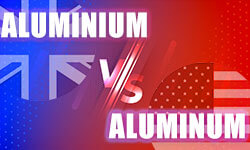
In academic writing, a consistent style is essential. Regardless of whether you’re working on a research paper, essay, or thesis, it’s vital to uphold a clear and academic tone. Many students struggle to distinguish between British English vs. American English, particularly when deciding between “aluminium” and “aluminum”. This article will elucidate the distinction between these two, leaving no questions unanswered.
Inhaltsverzeichnis
“Aluminium” or “aluminum”
“Aluminium” and “aluminum” both act as nouns in British and American English. They differ by only one letter, which changes the inflection, but refer to the same chemical element with the atomic number 13. The distinction in spelling is based on regional variations:

British English
Aluminium

American English
Aluminum
As illustrated, the word has two correct spellings, differing by a single letter. It’s essential to stay consistent with the version of English you’re using. While “aluminium” is the preferred spelling in the UK, “aluminum” is more commonly used in the US.
Examples of using “aluminium” and “aluminum”
The subsequent examples highlight how “aluminium” and “aluminum” are used in sentences in British English vs. American English.


FAQs
The main difference lies in regional spelling variations. “Aluminium” is the preferred spelling in the UK, Australia, and most parts of the world outside North America. On the other hand there is “Aluminum”, which is commonly used in the United States and Canada. Both terms refer to the same chemical element with the atomic number 13.
Both spellings have historical origins. Sir Humphry Davy first identified this element and originally named it “alumium” and later “Aluminum”. British writers and editors changed it to “aluminium” to align more closely with other elements like sodium, potassium, etc. Meanwhile, “aluminum” persisted in American English.
In Canadian English, “aluminum” is spelled without the latter “i”.
- ✓ Free express delivery
- ✓ Individual embossing
- ✓ Selection of high-quality bindings
